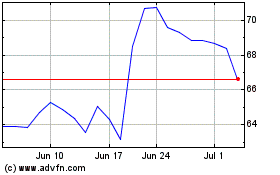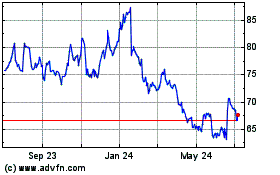Merck Revenue Rises on Cancer, Hepatitis Treatments
July 29 2016 - 8:40AM
Dow Jones News
Merck & Co. posted an unexpected increase in revenue as new
cancer and hepatitis treatments bolstered results.
The drugmaker also updated its guidance for the year, which is
mostly in-line with analyst forecasts.
The quarter's pharmaceutical revenue increased 1.6% to $8.7
billion driven by growth in cancer treatments, hospital acute care,
cardiovascular treatments and vaccines.
Cancer drug Keytruda posted sales of $314 million in the most
recent quarter, compared with $110 million in the same quarter last
year. Merck is continuing to develop and launch the drug for
different types of cancers, and its development program includes 30
tumor types across more than 300 clinical trials.
In January, the U.S. Food and Drug Administration approved
Merck's new treatment, Zepatier, for hepatitis C, the latest
entrant in a booming market for drugs for the viral infection—a
market now dominated by Gilead Sciences Inc. Zepatier had sales of
$112 million, compared with $50 million in the first quarter.
Nasonex sales fell 53% in the first quarter from the year prior.
A generic version of the treatment became available in the U.S. in
March, and the company has said it expects significant losses in
future sales.
Sales of Remicade, a treatment for inflammatory diseases,
decreased 26% because of a loss of exclusivity and the accelerating
impact of competition by biosimilar drugs.
Combined sales of Type 2 diabetes treatments Januvia and Janumet
increased 2%, while combined sales of cardiovascular drugs Zetia
and Vytorin grew 4% on price increases.
I.V. antibiotic Cubicin posted 22% sales growth to $357 million
on price increases, but Merck said it had lost patent protection in
June and that it expects a significant decline in sales.
HPV vaccines Gardasil and Gardasil 9 fell 8% to $393 million due
to the timing of public sector purchases.
Earlier this month, Merck said it planned to lay off
research-and-development workers at three East Coast sites in a
shake-up of its early-stage drug-hunting efforts. At the same time,
Merck plans to start new laboratories in Cambridge, Mass., and the
San Francisco Bay Area, as part of a trend among large drugmakers
to try to tap into hot clusters of biotechnology startup activity
and academic research.
For the quarter, the company posted a profit of $1.21 billion,
or 43 cents a share, up from $687 million, or 24 cents a share, a
year prior. Excluding restructuring and acquisition-related costs,
per-share earnings rose to 93 cents from 86 cents.
Sales grew 0.6% to $9.84 billion.
Analysts polled by Thomson Reuters had forecast per-share
earnings of 91 cents a share on revenue of $9.78 billion.
For the year, Merck now projects per-share adjusted earnings
between $3.67 and $3.77 on revenue between $39.1 billion and $40.1
billion. Analysts had expected adjusted earnings of $3.72 a share
on revenue of $39.49 billion.
Shares, which have grown 6.6% in the last three months, grew
1.7% in premarket trading.
Write to Austen Hufford at austen.hufford@wsj.com
(END) Dow Jones Newswires
July 29, 2016 08:25 ET (12:25 GMT)
Copyright (c) 2016 Dow Jones & Company, Inc.
Gilead Sciences (NASDAQ:GILD)
Historical Stock Chart
From Mar 2024 to Apr 2024

Gilead Sciences (NASDAQ:GILD)
Historical Stock Chart
From Apr 2023 to Apr 2024
